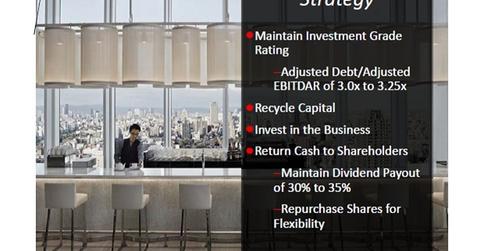Why Marriott is Buying Back Its Own Shares
Marriott repurchased 7.7 million shares of common stock valued at $544 million in 4Q14 and 24 million shares for $1.5 billion in 2014.
Nov. 20 2020, Updated 2:52 p.m. ET

Dividends
Marriott International’s (MAR) capital allocation strategy includes returning excess cash to the shareholders through dividends and share repurchases. On February 12, 2015, Marriott announced that its board of directors declared a quarterly cash dividend of $0.20 per share of common stock. The dividend is payable on March 27, 2015, to shareholders of record as of February 27, 2015. Marriott maintains a dividend payout ratio of around 33%.
Marriott’s current dividend yield is 1.0%. For companies like Starwood Hotels and Resorts (HOT) and Wyndham Worldwide (WYN), the current dividend yield is ~1.9%.
Share repurchases
Marriott International’s board also increased the authorization to repurchase the company’s Class A common stock by an additional 25 million shares, for a total of ~40 million shares currently authorized for repurchase. Shares may be purchased through the open market or via privately negotiated transactions.
Marriott repurchased 7.7 million shares of common stock valued at $544 million in 4Q14 and 24 million shares for $1.5 billion in 2014. To date in 2015, Marriott has repurchased 3.6 million shares for $275 million.
The management of companies like Hilton Worldwide (HLT) could consider returning capital to the shareholders after controlling its leverage levels. To learn more, please read Hilton could start returning capital to shareholders.
Funds like the PowerShares Dynamic Leisure and Entertainment Portfolio ETF (or PEJ) and the Consumer Discretionary Select Sector SPDR Fund (XLY) track the performances of these companies.
Reason behind share buyback
Marriott International president and CEO Arne Sorenson noted, “Buying back stock is an inherently more flexible approach than dividends. It allows us, in an industry that does have ups and downs, to calibrate much more instantly and also in a stage of our business where we are jumping at opportunities when they present in a way that’s compelling….Share repurchase also allows us to flex up and down on a short-term basis in a way that accounts for the other investment activity that we’ve been making.”
